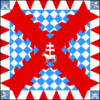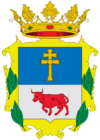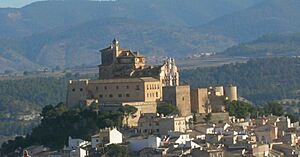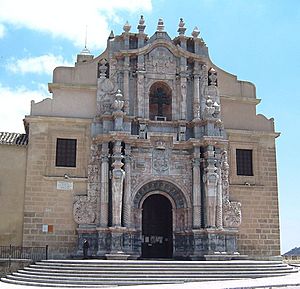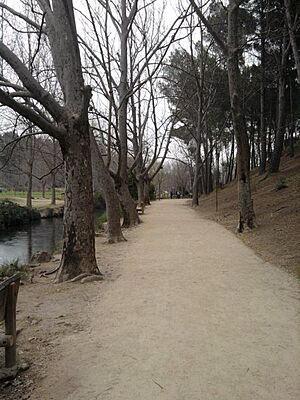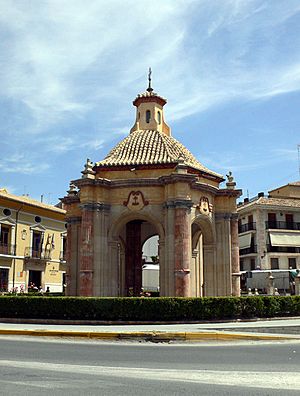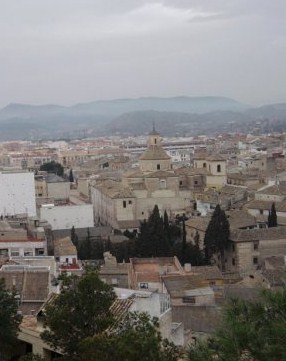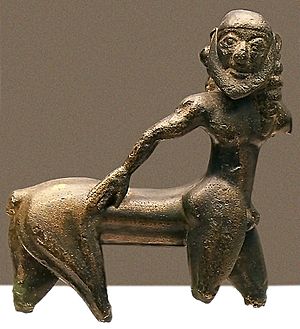Caravaca de la Cruz facts for kids
Quick facts for kids
Caravaca de la Cruz
|
|||
|---|---|---|---|

Panorama of Caravaca
|
|||
|
|||
| Country | Spain | ||
| Autonomous community | Region of Murcia | ||
| Province | Murcia | ||
| Comarca | Comarca del Noroeste | ||
| Judicial district | Caravaca de la Cruz | ||
| Area | |||
| • Total | 859 km2 (332 sq mi) | ||
| Elevation | 800 m (2,600 ft) | ||
| Population
(2018)
|
|||
| • Total | 25,730 | ||
| • Density | 29.953/km2 (77.58/sq mi) | ||
| Demonym(s) | Caravaqueño, ña | ||
| Time zone | UTC+1 (CET) | ||
| • Summer (DST) | UTC+2 (CEST) | ||
| Postal code |
30400
|
||
Caravaca de la Cruz (often shortened to Caravaca) is a town and municipality in southeastern Spain. It is located in the Region of Murcia, near the River Argos. Caravaca is the capital of the northwest part of the Murcia region. In 2010, about 26,449 people lived there.
Caravaca is known as one of the five Holy Cities in Catholic Christianity. It was given a special privilege in 1998 by Pope John Paul II to celebrate a jubilee year forever. This means it celebrates a jubilee every seven years. The first one was in 2003, and the second in 2010, which attracted over a million visitors.
The town is famous for its medieval Santuario de la Vera Cruz (Shrine of the True Cross). This shrine is a group of buildings that holds what many believe are pieces of the True Cross. These relics are thought to have special powers. A big festival is held every year from May 1st to 5th to celebrate them. This festival is so important that it was declared an International Tourist Interest in 2004.
During the festival, there are parades of Moors and Christians. A special event called the Horses of Wine is also very popular. People hope this event will soon be listed as an Intangible Cultural Heritage of Humanity by UNESCO.
Contents
Exploring Caravaca's History and Culture
Caravaca de la Cruz has many interesting places to visit, including old buildings and museums. The hills nearby have lots of marble and iron. Long ago, the town was a busy place for making iron, leather, paper, chocolate, and oil. In 2009, archaeologists found a large site with 1,300 graves from 2400 to 1950 BC.
Museums to Visit
- Museo de la Vera Cruz: This museum is inside the Castle of Santa Cruz.
- Museo de la Fiesta: Learn about the special festivals honoring the Holy Cross of Caravaca.
- Museo José Carrilero: A museum dedicated to sculpture.
- Museo Arqueológico Municipal: Discover ancient artifacts found in the area.
- Museo de música étnica de Barranda: Explore ethnic music.
- Museo Etnográfico en Miniatura "Angel Reinón": See miniature ethnographic displays.
Important Monuments and Buildings
- Castle and Basilica of Vera Cruz: This is where the Cross of Caravaca is kept. It's built on an old Islamic fortress.
- Iglesia Parroquial de "El Salvador": A beautiful example of Renaissance architecture from the 16th century.
- Church of the Holy Conception: This church has a tall tower and a painted wooden ceiling from the 16th century.
- Church of the Jesuits: Built in the 17th century, it's now a cultural center.
- Carmelite Convent and Church Mothers of St. Joseph: Known for its Rococo style.
- Discalced Carmelite Convent: Founded in 1586 by St. John of the Cross.
- Church and Convent of Santa Clara: Established in 1609.
- City Hall: A Baroque building designed by Jaime Bort.
- The "Templete": A unique hexagonal Baroque building. Every May 3rd, the Holy Cross is bathed here in a ritual that started in 1384.
- The Plaza de Toros: This bullring was built in 1880 on an old Franciscan monastery.
- Sculptures: You can see many sculptures by famous artists like Rafael Pi Belda around the town.
- The Medieval District: Explore the old streets around the castle, like Calle Mayor and Calle de las Monjas, with their traditional houses.
Famous Festivals
The festivals honoring the Holy Cross of Caravaca are held from May 1st to 5th. They were declared of International Tourist Interest in 2004.
These exciting events include:
- Southeast Migas Competition: Held on April 30th, known as "Night of the Crumbs."
- Bareback Horse Contest: Takes place on May 1st.
- Processions with the Cross of Moors and Christians: On May 2nd and 3rd.
- Fiesta de la Santisima y Vera Cruz: The main celebration on May 3rd.
- Moors and Christians Parade: A grand parade on May 4th.
- Procession of the Holy and Vera Cruz: The final procession on May 5th.
The Legend of the Holy Cross
Long ago, in the 8th century, parts of Spain were taken over by Arabs and Berbers. This led to many conflicts that lasted for nearly 800 years.
Around 1231, a special event happened in Caravaca de la Cruz. The town was controlled by a Muslim king named Zeyt-Abuzeyt. A Christian missionary, Don Gínes Pérez Chirinos, was captured. The king was curious about Christianity and asked the missionary to show him how a Mass was performed.
Don Gínes agreed, but he needed a cross for the altar. Suddenly, two angels appeared from the sky, carrying a cross. They placed it on the altar and then disappeared! As the priest continued the Mass, the king saw a beautiful baby instead of the bread. This miracle amazed the king, and he and his family decided to become Christians. Many believe the cross brought by the angels contained a piece of the True Cross.
Centuries later, copies of the Caravaca Cross were taken to the Americas by Franciscan friars. Even today, you can see this cross design in churches and homes there. It's often seen as a good luck charm.
The Caravaca Cross has two horizontal bars, with the body of Jesus on it. It is a symbol of the city, offering protection and strength to its people. For almost 800 years, the cross was guarded by the Knights Templar and later by the Order of Santiago.
The "Horses of Wine" Festival
The "Los Caballos del Vino" (Horses of Wine) festival is a unique and exciting celebration held on May 2nd. It's part of the larger Moors and Christians festivals.
On this day, horses decorated with amazing embroidered robes of silk and gold take over the city streets. The most exciting part is the race of the horses up the castle slope. This event is a display of strength, beauty, and tradition.
The festival's origins are a mix of history and legend. In the 13th century, the Knights Templar and townspeople were under siege by a Muslim army in the castle. Their water became undrinkable, making people sick. Scouts rode out on horses to find water, but the nearby wells were poisoned. In desperation, they found wine, loaded it onto their horses, and raced back to the castle.
The wine was blessed with the Caravaca Cross and given to the sick, who immediately recovered. The blessed wine was then mixed with the poisoned water in the storage tanks, making it fresh again. This helped the Christians resist the enemy.
Today, this annual festival remembers those events. It includes a ceremony to bless the water used by local farmers. Young men and horses are decorated with beautiful robes and flowers, honored as heroes. The festival has been celebrated since the Middle Ages, becoming more elaborate in the 18th century.
The "Wine Horses" celebration starts early on May 2nd. Horses are washed and harnessed in different parts of the city. Then, the horse and its four handlers prepare to parade through the streets, attracting many followers.
Entertainment and Nature
Caravaca de la Cruz offers various cultural activities and beautiful natural spots.
Cultural Venues
- Thuiller Theatre: Built in 1843, this theater was renovated in 2006. It hosts plays and other performances.
- Culture House: Another important place for cultural events.
- Cultural Center: Located in the old Church of the Society of Jesus, it's a hub for arts and films.
One popular event is the Theatre Week Caravaca de la Cruz, which has been held every July in the Plaza de Toros for over 30 years.
Natural Beauty
Las Fuentes del Marques is a beautiful natural area. It's known for its many clear water springs that create a unique landscape. Here, you can find the Tower of the Templars, a small medieval castle that once defended Caravaca. There's also a nature center that teaches visitors about the birds, fish, and small animals living in the area.
See also
 In Spanish: Caravaca de la Cruz para niños
In Spanish: Caravaca de la Cruz para niños
 | Claudette Colvin |
 | Myrlie Evers-Williams |
 | Alberta Odell Jones |


